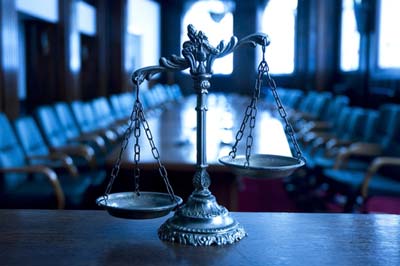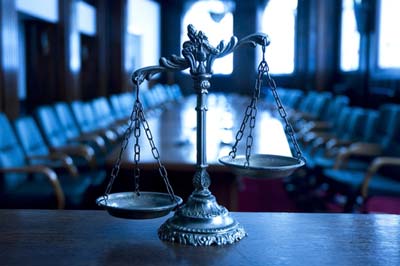
 (Image: Court justice via Shutterstock)Did you know that, no matter the evidence, if a jury feels a law is unjust, it is permitted to “nullify” the law rather than finding someone guilty? Basically, jury nullification is a jury’s way of saying, “By the letter of the law, the defendant is guilty, but we also disagree with that law, so we vote to not punish the accused.” Ultimately, the verdict serves as an acquittal.
(Image: Court justice via Shutterstock)Did you know that, no matter the evidence, if a jury feels a law is unjust, it is permitted to “nullify” the law rather than finding someone guilty? Basically, jury nullification is a jury’s way of saying, “By the letter of the law, the defendant is guilty, but we also disagree with that law, so we vote to not punish the accused.” Ultimately, the verdict serves as an acquittal.
Haven’t heard of jury nullification? Don’t feel bad; you’re far from alone. If anything, your unfamiliarity is by design. Generally, defense lawyers are not allowed to even mention jury nullification as a possibility during a trial because judges prefer juries to follow the general protocols rather than delivering independent verdicts.
Surprisingly, the Supreme Court has routinely agreed that judges have no obligation to inform juries about jury nullification. Paradoxically, jury nullification is permitted to exist as an option to all juries, yet this option cannot be discussed in most courtrooms.
A few years ago, Julian Heicklen handed out pamphlets to passersby on jury nullification to people outside of a federal courthouse. While the former professor was merely attempting to educate people about how the jury system works, he was charged with jury tampering. The prosecution labeled Heicklen “a significant and important threat to our judicial system,” but the judge ultimately disagreed and dismissed the case. Nonetheless, the fact that this case went to court at all shows how those in the legal system are willing to intimidate those who vocalize this loophole.
Jury nullification is undoubtedly feared because of its ability to upset the system. A jury that considers drug laws to be outrageous can nullify. A jury that is aware of the mass inequality in incarceration rates and believes a defendant was targeted via racial profiling can nullify. A jury that believes a harmless defendant is a victim of the prison industrial complex rather than a perpetrator can nullify. This counter-verdict exists so that citizens can right the wrongs inherent in our supposed “justice” system.
Of course, as the New York Times points out, jury nullification hasn’t always been used to “do good.” Historically, racist southern juries have nullified cases involving hate crimes and overly optimistic juries have nullified instances of police brutality, unwilling to fault police officers. However, if you agree that an informed jury can produce the correct verdict, nullification remains a valuable tool in the pursuit of justice.
Jury nullification would be helpful in a case like the recently publicized trial of Cecily McMillan. After having her breast groped from behind by a police officer, McMillan, an Occupy Wall Street activist, reflexively elbowed backward and was subsequently charged with assaulting an officer. After the judge suppressed relevant evidence, the jury ultimately felt compelled to render a guilty verdict, but its members were surprised to later learn that that verdict carried a potential seven-year sentence. Nine out of twelve jurors later wrote a letter to the judge urging him not to send McMillan to prison. Had these jurors known about jury nullification, they could have initially said, “Technically guilty, we supposed, but COME ON!” and not left her subject to harsh, unwarranted punishment.
It’s absurd that such an immense power remains a secret to jurors throughout the process. Essentially, it’s a crapshoot as to whether a juror has prior knowledge of the ability to nullify – an unfair fate given what’s at stake.
Whether or not you choose to exercise the option of jury nullification the next time you serve on a jury is up to your own discretion, but all jurors should at least be aware that this option is available to them. Spread the word.
Press freedom is under attack
As Trump cracks down on political speech, independent media is increasingly necessary.
Truthout produces reporting you won’t see in the mainstream: journalism from the frontlines of global conflict, interviews with grassroots movement leaders, high-quality legal analysis and more.
Our work is possible thanks to reader support. Help Truthout catalyze change and social justice — make a tax-deductible monthly or one-time donation today.